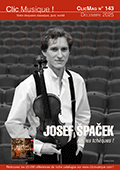|
|
|
Classica from April 2024
Review de Olivier Brunel
Page No. 102
Format : 1 CD
Total Time : 01:11:16
Recording : 02-05/05/2022
Location : Pfaffendorf
Country : Autriche
Sound : Studio / Stereo
Label : Challenge Classics
Catalog No. : CC72934
EAN : 0608917293425
Price Code : DM019A
Publishing Year : 2023
Release Date : 06/09/2023
Genre : Classical
|
|
 |
Johannes Brahms (1833-1897)Extrait de "Deutsche Volkslieder", WoO 33 n° 1
n° 2
n° 3
n° 5
n° 6
n° 11
n° 12
n° 16
n° 17
n° 25
n° 35
n° 36
n° 41
n° 42 Sonntag, op. 47 n° 3 Norbert Glanzberg (1910-2001)In Memoriam, Holocaust Lieder Im Gefängnis
Abschied
Für Ule
Alter Baum
Nachtgedanken
Der Ofen von Lublin
Versprich mir eins
Die letzte Epiphanie
Lied zur guten Nacht
Greta
An die Völker der Erde Franz Schubert (1797-1828)Abenstern, D 806 Thilo Dahlmann, basse-baryton
Hedayet Jonas Djeddikar, piano
|
 
 Côté soleil, des chants populaires anonymes tout simples dont Brahms disait "le plus faible de ces chants a autant de valeur que le meilleur de mes lieder". Ces 16 chansons innocentes tirées de l’opus 33 qui en compte 49 sont humblement ornementées par Brahms qui les découvrit chez Robert et Clara Schumann en 1854. Côté nuit, l’enfer nazi rapporté dans des poèmes déchirants sur des mélodies tonales de grande tradition romantique composées par Glanzberg en 1984. Comme nous sommes loin de "Padam, padam" pour Piaf et "Les grands boulevards" pour Montand du même Glanzberg ! Ici, hommage aux suppliciés dont certains, avant de mourir, ont décrit leur prison, leurs adieux, l’horrible four de Lublin… L’album est intitulé "La dernière Épiphanie" d’après le poignant poème de Werner Bergengruen sur l’inévitable jugement des bourreaux. "Aux peuples de la terre" du même Bergengruen termine ce cycle éprouvant. Schubert conclut sur la note désolée de son admirable "Abendstern". On ne pourra apprécier ces pages que par la recherche de leur traduction en français. L’interprétation sensible et nuancée de Thilo Dahlmann et de Hedayet Jonas ne mérite que des éloges. (Gérard Martin)  Thilo Dahlmann and Hedayet Djeddikar. "I sow, I see no seed, and I remain mournfully silent at home." With these words of Johann Mayerhofer full of mourning and melancholy from Schubert's "Abendstern", we as performers look back on the content of this CD. It juxtaposes compositions that could hardly be more opposite. The past century, like so many before and after it, has not only sown good seeds. Norbert Glanzberg had to experience one of the greatest human catastrophes of the century himself, the Holocaust. Long after the end of the war, he managed to clothe the horror he suffered in music through the words of other persecutees and victims of National Socialism. Music that could not be more beautiful in many places. A beauty that is only painful to bear in view of the texts set to music. In selecting the pieces for this recording, we were guided by Norbert Glanzberg's compositional approach of countering horror with beauty. Therefore, folk song settings by Johannes Brahms form the beginning of this CD. Songs that, like few other songs in the Romantic lied repertoire, can embody the greatest possible innocence and impartiality in text and music. It is precisely this contrast that illustrates in our eyes the breaking of human and civilisational culture through the horrors of the Holocaust. A "break-up" that Norbert Glanzberg has masterfully set to music in his cycle "In Memoriam".
 |
| . |
 |
|
|
